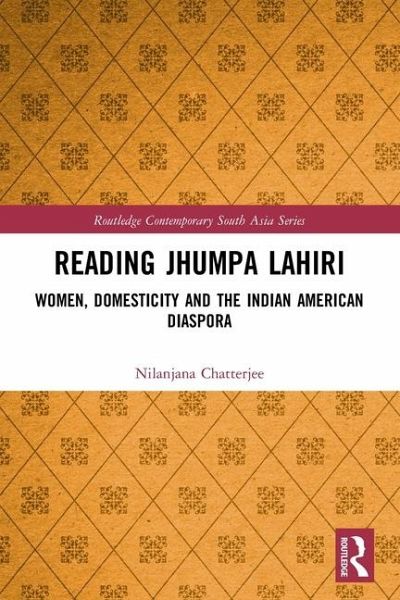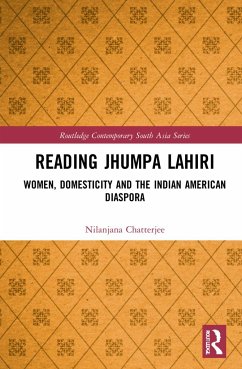
Reading Jhumpa Lahiri
Women, Domesticity and the Indian American Diaspora
Versandkostenfrei!
Versandfertig in 6-10 Tagen
45,99 €
inkl. MwSt.
Weitere Ausgaben:

PAYBACK Punkte
23 °P sammeln!
This book is an innovative and rigorous study of Jhumpa Lahiri's Indian American female characters' lived and imagined diasporic house space, using domesticity and the house as an analytical tool to explore their hidden domestic spaces.The book explores how the house as a spatial construct, shares a symbiotic relationship with its inhabitants, and through their implicit and explicit response to various parts of their diasporic house space, interprets their maladies, limitations and opportunities. Indian American diasporic women, especially homemakers, have long been grappling with issues of so...
This book is an innovative and rigorous study of Jhumpa Lahiri's Indian American female characters' lived and imagined diasporic house space, using domesticity and the house as an analytical tool to explore their hidden domestic spaces.
The book explores how the house as a spatial construct, shares a symbiotic relationship with its inhabitants, and through their implicit and explicit response to various parts of their diasporic house space, interprets their maladies, limitations and opportunities. Indian American diasporic women, especially homemakers, have long been grappling with issues of socio-cultural invisibility as they have no other space to interact with except their houses in the hostland, now more than ever, during the global corona crisis. A reading of this multi-layered relationship between houses and their women will help readers understand not only the political, intellectual, emotional and sexual dispositions of middleclass Indian women in America, butalso social, cultural and economic positions they occupy within the hostland. The book shows the represented domestic interstices and looks at them as signifiers of distinct individual trajectories, wherein lies embedded the women inhabitants' oppositions beneath the acceptance of normative Indian family values in diaspora. It also offers elemental insights into ways in which migration acts as an opportunity for establishing new, often hybridized, identities, for which it is important to realise their connections with their house space.
Presenting an alternative methodology for reading real and imagined lives of women in Indian American diaspora, the book proposes an unconventional mode of understanding diasporic realities and representations in cultural studies that is not readily apparent. It will be of interest to researchers in the field of South Asian Studies, Diaspora Studies, Migration Studies, Culture Studies, Feminist Writings, Gender Studies and Asian Literature.
Foreword by Bill Ashcroft
The book explores how the house as a spatial construct, shares a symbiotic relationship with its inhabitants, and through their implicit and explicit response to various parts of their diasporic house space, interprets their maladies, limitations and opportunities. Indian American diasporic women, especially homemakers, have long been grappling with issues of socio-cultural invisibility as they have no other space to interact with except their houses in the hostland, now more than ever, during the global corona crisis. A reading of this multi-layered relationship between houses and their women will help readers understand not only the political, intellectual, emotional and sexual dispositions of middleclass Indian women in America, butalso social, cultural and economic positions they occupy within the hostland. The book shows the represented domestic interstices and looks at them as signifiers of distinct individual trajectories, wherein lies embedded the women inhabitants' oppositions beneath the acceptance of normative Indian family values in diaspora. It also offers elemental insights into ways in which migration acts as an opportunity for establishing new, often hybridized, identities, for which it is important to realise their connections with their house space.
Presenting an alternative methodology for reading real and imagined lives of women in Indian American diaspora, the book proposes an unconventional mode of understanding diasporic realities and representations in cultural studies that is not readily apparent. It will be of interest to researchers in the field of South Asian Studies, Diaspora Studies, Migration Studies, Culture Studies, Feminist Writings, Gender Studies and Asian Literature.
Foreword by Bill Ashcroft














